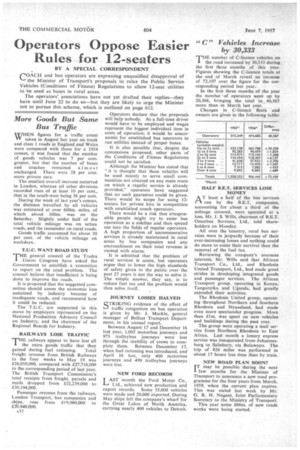Operators Oppose Easier Rules for 12-seaters
Page 34

If you've noticed an error in this article please click here to report it so we can fix it.
BY A SPECIAL CORRESPONDENT
COACH and bus operators are expressing unqualified disapproval of the Minister of Transport's proposals to relax the Public Service Vehicles (Conditions of Fitness) Regulations to allow 12-seat utilities to be used as buses in rural areas.
The operators' associations have not yet drafted their replies-they have until June 22 to do so-but they are likely to urge the Minister not to pursue this scheme, which is outlined on page 612.
Operators declare that the proposals will help nobody. As a full-time driver would have to be employed and wages represent the biggest individual item in costs of operation, it would be uneconomic for established bus operators to. run utilities instead of proper buses.
It is also possible that, despite the concessions proposed, other parts of the Conditions of Fitness Regulations could not be satisfied.
Although the Minister has stated that "it is thought that these vehicles will be used mainly to serve small communities not situated on any main route on which a regul1r service is already provided," operators have suggested that no such guarantee could be given. There would be scope for using 12seaters for private hire in competition with established coach operators.
There would be a risk that irresponsible people might try to enter bus operation as a sideline and then spread out into the fields of regular operators. A high proportion of unremunerative services is already maintained in rural areas by bus companies and any encroachment on their total revenue is viewed with alarm.
It is admitted that the problem of rural services is acute, but operators argue that to lower the high standards of safety given to the public over thefl past 27 years is not the way to solve it. The simple answer, they say, is to reduce fuel tax and the problem would then solve itself.
JOURNEY LOSSES HALVED QTR1KING evidence of the effect of 1.--) traffic congestion on bus operation is given by Mr. J. 'Mackie, general manager of Belfast Transport Department, in his annual report.
Between August 17 and December 16 last year, 1,005 motorbus journeys and 973 trolleybus journeys were lost through the inability of crews to complete them. Between December 17, when fuel rationing was introduced, and April 16 last, only 460 motorbus journeys and 490 trolleybus journeys were lost.
NEW FORD RECORDS
I AST month the Ford Motor Co.,
Ltd., achieved new production and export records. Some 35,000 vehicles were made and 20,000 exported. During May ships left the company's wharf for the Great Lakes of North America, carrying nearly 400 vehicles to Detroit.












































































































